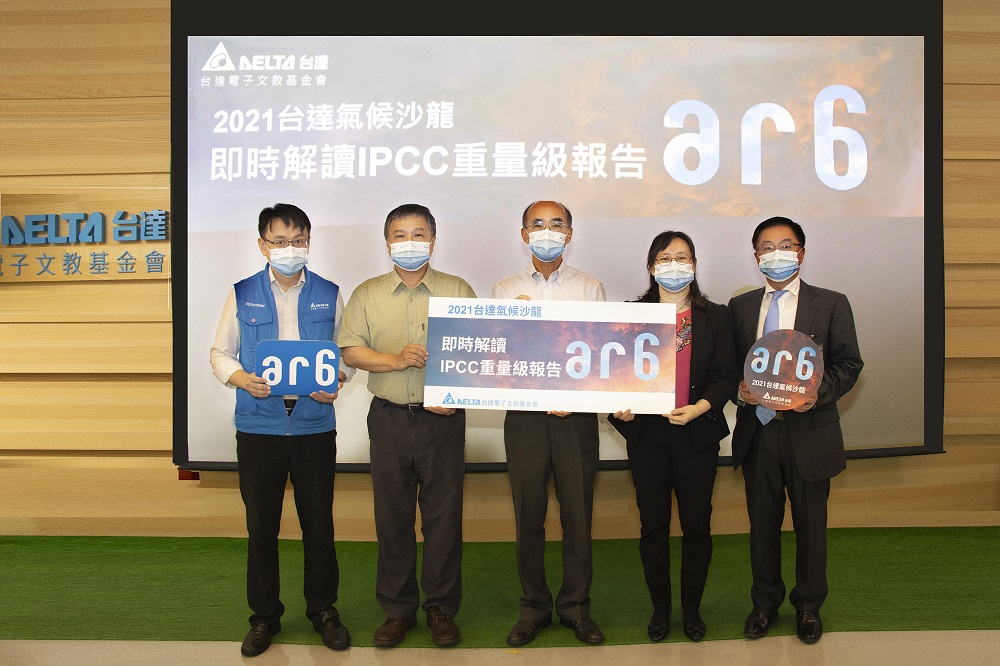
Delta Electronics Foundation has for long promoted climate and energy issues. On August 10, the foundation hosted "Delta Climate Salon" online to timely analyze the "AR6 Climate Change 2021: The Physical Science Basis", published by Intergovernmental Panel on Climate Change (IPCC). The foundation also invited Dr. Huang-Hsiung Hsu (Distinguished Research Fellow of Research Center for Environmental Changes, Academia Sinica), Dr. Shih-Chun Candice Lung (Deputy Executive Secretary of Center for Sustainability Science, Academia Sinica) and Prof. Chyi-Rong Chiou (Biodiversity Research Center of National Taiwan University), to share the in-depth analysis of climate change impacts in Taiwan. The live stream attracted more than 500 audiences and gathers opinions exchange online.
Ms. Shan-Shan Guo, the Chief Brand Officer of Delta, pointed out that in the past time, Delta Electronics Foundation had ever interpreted IPCC Fifth Assessment Report, Special Report on Global Warming of 1.5 °C and Special Report on the Ocean and Cryosphere in a Changing Climate. The foundation hoped to raise public awareness on climate emergency through summarizing these climate information and scientific evidence. This year, Delta initiates the 50th-anniversary celebration with the commitment to "sustainable conservation, nurturing life". Echoing the pledge, the foundation initiates some projects to address air pollution and climate crisis with healthy buildings and low-carbon mobility strategies. Furthermore, the foundation has partnered with professional marine conservation teams to restore coral reefs along northeast coast of Taiwan. All the achievements will be popularized in the upcoming online forums hosted by the foundation.
According to the IPCC "AR6 Climate Change 2021: The Physical Science Basis" report, the total human-caused global surface temperature has increased 1.07°C since 1850–1900. Global warming of 1.5°C relative to 1850-1900 would be exceeded during the 21st century under numerous scenarios. On the aspect of regional climate change, the Arctic will continue to warm at about 2-4 times the rate of global warming. Especially in East Asia, monsoon precipitation is projected to increase in the mid-to long term at global scale. Besides, global mean sea level has risen faster since 1900 than over any preceding century in at least the last 3000 years. It has already increased by 0.2 m between 1901 and 2018. If we could not mitigate climate change, it will increase the frequency and severity of flooding in low-lying areas.
In addition, this report sheds a light on methane (CH4) because its global warming potential is 84 times more powerful than carbon dioxide. Methane mainly results from livestock, agricultural practices, coal mining, and fossil fuel industry. Lastly, AR6 reaffirms that global warming is unequivocally caused by human activities. Reaching net-zero emission by mid-century could avoid the worst climate impacts.
At the live streaming, the local scholars echo the findings in AR6. At first, Dr. Huang-Hsiung Hsu presented the information from meteorological stations in Taiwan over the past 100 years. He gave a comprehensive climate risk assessment to identify the likely climate impacts Taiwan will encounter in the future. Now Taiwan is facing threats from prolonged summer, Dr. Shih-Chun Lung then gave health recommendations and adaptation strategies for people usually exposed to extreme heat. Prof. Chyi-Rong Chiou, on the other hand, reminded people that climate adaptation is a key to local agriculture, and the recently initiated “nature-based solutions” is helpful to facilitate adaptation.
Mr. Jesse Chou, Chief Sustainability Officer and Spokesperson of Delta, shared the corporate actions to hold the warming within 1.5°C through its core competence in power and thermal management solutions. After passing the Science-based Targets (SBT) in 2017, Delta aimed to achieve 56.6% reduction in its carbon intensity by 2025, compared with 2014 level. In 2020, the company had already reduced its carbon intensity by over 55%. Besides, the total renewable energy usage ratio had reached approximately 45.7%. This year, Delta signs the power purchase agreement (PPA) with TCC Green Energy Corporation for the procurement of approximately 19 million kWh of green electricity annually. TCC has the largest renewable energy available transfer capacity in Taiwan and will supply the green electricity to Delta from TCC's 7.2MW wind turbine infrastructure. It is a step that contributes to Delta's RE100 commitment to reach 100% utilization of renewable energy, as well as carbon neutrality in its global operations by 2030.
IPCC is established in 1988 by the World Meteorological Organization (WMO) and the United Nations Environment Programme (UNEP). IPCC publishes assessment reports every 5 to 7 years to provide governments with scientific information that they can use to develop climate policies. Its latest "AR6 Climate Change 2021: The Physical Science Basis" report has attracted great attention. This report is expected to influence the climate negotiations at COP26.